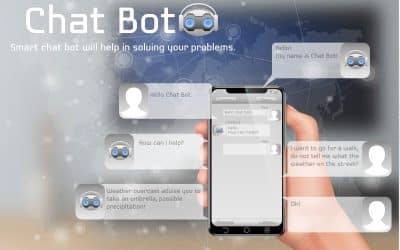In 2024, integrating artificial intelligence into daily operations has been an industry-wide game changer. AI-driven automation, personalization, data analysis, and innovations improve processes and give companies a competitive advantage. But, this change can also pose a challenge to workforce adaption and ethical issues. The success of this new era driven by AI will require businesses to realize their potential while taking on the issues.
Utilizing AI to transform business processes has become an everyday routine for companies across the globe. AI is sure to be the next step in the development of the digital world and business processes. Experts are warning that businesses that still need to embrace AI may fall behind their counterparts.
Find out more about the significance of artificial Intelligence in the business transformation process and how artificial intelligence can alter the business landscape and create the world’s first digital revolution.
What Does AI Consulting Means?
Artificial intelligence consulting is the process where AI experts and engineers help businesses from various industries implement AI applications to meet their objectives. It is much easier said than done since it requires an array of tasks and is a lengthy process. However, AI Consulting is crucial in strategic business decision-making and keeping competitive.
AI consulting firms have various tasks and responsibilities, including aiding businesses in making the most of their resources and finding ways to cut costs without sacrificing quality. They also make, integrate, customize, and maintain AI applications. The training of employees will help them utilize the tools in their day-to-day tasks.
Understanding Artificial Intelligence
Before examining how artificial intelligence is changing businesses, it’s essential to understand the basics of the technology and what it can accomplish. Artificial intelligence refers to a variety of computer software that can perform activities that resemble human beings. These include learning and planning, solving complicated problems, and displaying basic creative thinking.
But AI in the context of modern business operations has been defined more specifically. AI includes tools like machine learning. This is among the most popular types of AI for business and processes huge quantities of data in a short time with algorithms that are capable of learning while they function. This helps companies of all kinds maximize their operations by incorporating new trends and maintaining their workflows in good order.
Deep learning is an additional aspect of AI that is designed for use in business that relies on neural networks – interconnected groups of AI “nodes” – to create non-linear reasoning. Deep learning is crucial to more sophisticated applications. The ability to analyze the impact of various variables simultaneously makes it ideal for applications like fraud detection, assisting in the operation of autonomous vehicles, and many more.
Deep learning is an excellent option for business applications. While ML algorithms generally exhibit an inability to perform after gathering specific quantities of data and having a certain amount of data, deep learning models could rapidly increase their efficiency and capabilities as they process and receive more information. This signifies that deep-learning models offer more scale while offering more specific and granular insights as well as applications for humans.
Which Industries Is AI Changing?
AI is quickly altering the structure of many industries around the world. This emerging technology is particularly transforming specific sectors.
Automotive Industry
The automotive industry is increasingly employing AI-based software to allow the creation of autonomous vehicles that can navigate their surroundings safely by utilizing data signals from sensors for vision.
Education Sector
In education, AI is enabling faster and more customized learning plans that are tailored to each student’s needs and learning style. Large Language Models (LLM) and retrieval-augmented generation (RAG) aid in the creation of personalized assistive learning tools, customized learning experiences, and cross-language communication. This will provide an improved and more accessible education for both professionals and students.
Finance Sector
Banks and financial institutions use deep learning and machine learning to analyze customer chats, determine customer preferences and conditions, and provide personalized guidance and actionable insight.
Healthcare
The healthcare industry is taking note, and new apps are being created to offer an online first point of contact to patients. The apps utilize AI to offer free medical assistance to patients who need it or allow video consultations with doctors. This lets people access immediate, high-quality medical treatment without having to travel.
IoT
Technology, like the Internet of Things (IoT), has revolutionized how people work, live, and interact with their environment on a vast scale. The IoT offers a massive amount of data that allows for creating smart cities.
These cities use sensors and data science to enhance the functioning and security of urban zones. AI allows cities to make better and more informed decisions over time, such as decisions about how to improve the quality of air and reduce congestion on the roads while making their streets more accessible.
Software Development Industry
It is not surprising that the sector responsible for AI’s development will see significant changes because of AI’s capabilities. An IEEE survey surveyed executives from various countries about using AI applications. Supply chains, cybersecurity, and software development were among the three top areas in which executives saw the greatest potential.
Research Analysis
The entire job function, like market research, relies on the requirement for information-driven decisions. The market research sector alone reached $81 billion in 2022 and has grown nearly twofold since 2008.
Today, collecting research and analyzing data is a business that consists of more than just market research. It affects everything from academics to the legal professions. AI is going to partially replace information gathering and analysis. However, it certainly will make it easier to understand the analytics and data behind some problems.
Machine learning algorithms and models will boost the speed at which professionals can analyze the data. AI is also more adept at managing large amounts of data, especially when it’s unstructured or scattered. The correlations that humans may not be able to detect or take longer to identify will be immediately recognized. The study will be faster and closer to the facts.
Strategies For Business Change Using AI To Expand Your Business
Artificial intelligence strategies for business could be employed to boost and develop various areas within an organization by streamlining processes such as predictive sales forecasting administration, customer support marketing, and cybersecurity. AI-based software can process vast quantities of sales data to provide accurate insights into future sales forecasts, trends in sales, and marketing initiatives.
These capabilities permit the taking of more strategic decisions in sales and marketing, the most efficient utilization of resources, and the anticipation of future challenges.
Enhance Productivity
Businesses can utilize artificial intelligence strategies to drive business transformation, reducing administrative burdens and automating tasks such as report creation, scheduling, and data entry to increase productivity.
AI system tools employ ML algorithms to gain knowledge from data sets and increase the efficiency of their task automation over time. They provide real-time monitoring and notifications for tasks in the administrative area, ensuring that tasks are completed on time.
Improve Customer Relations
Integrating AI into your business can improve customer relations management and increase lifetime customer value. An analysis by Insider Intelligence notes that almost 50 percent of marketers in the US will increase their AI spending in 2022 to support their strategies for managing customer relationships.
AI can provide personalized customer interaction, sentiment analysis tools, and predictive analytics. These tools can transform customer service and provide the most optimal customer experience, which, in turn, can improve lead conversion rates and sales.
Make Marketing Simpler
Generative AI tools could simplify and improve marketing. They can produce appealing written and visual content, generate customized customer interactions, and segment email marketing lists to increase customer acquisition rates.
Generative AI development could also give important insights into consumer preferences and behaviors. This permits the personalization of marketing campaigns and also simplifies the task of placing ads and social media posts and marketing via email.
Integration Of AI In Everyday Business Processes
Incorporating AI into everyday business processes is becoming more complex and widely used. Industries across the board, from healthcare to manufacturing, use AI to boost efficiency, enhance customer experience, and boost the development of new products and services.
In supply chain management, AI algorithms are utilized to predict demand and improve inventory levels. In addition to customer support, AI-powered chatbots and virtual assistants offer 24/7 assistance and support. This shift from experimental to use in the real world is an essential change in the perception of AI’s use and usage.
Cybersecurity and the security of customer data are also important aspects for modern-day businesses when transforming through AI security. AI management consulting can help.
Cyberattacks and online fraud are becoming frequent in our connected world. Fortunately, specific AI tools can mitigate the risk by using machine learning algorithms to identify the possibility of breaches and fraud and quickly react to any potential threats.
These tools analyze vast amounts of data to detect patterns and routine behaviors, enabling them to quickly identify suspicious activities and alert those in the know of potential threats.
This could allow your company to safeguard your data and its customers’ data while also aiding in maintaining its image in the field or niche in which it operates.
Benefits of AI Consulting Services
AI strategy consulting can bring various advantages to businesses. It allows them to understand the maze inherent in AI technology and maximize its capabilities to achieve business goals.
Here are some of the main benefits:
- Expert guidance: AI consultants bring specialized knowledge and experience to help companies determine how AI technologies match their objectives and how they can use them efficiently.
- Strategic planning Consultants help create a strategy to guide AI adoption, ensuring that AI initiatives align with broader business and goal strategies.
- Risk Mitigation: By conducting thorough study and preparation, AI consultants help identify possible pitfalls when working on AI projects, allowing firms to avoid costly mistakes and reduce the risks.
- Personalised Solutions: AI Consulting Company tailor AI solutions to meet specific business requirements and provide custom-designed development that meets each client’s specific operational needs.
- Competitive Advantage: Companies could achieve a competitive advantage in their market by leveraging AI to increase efficiency, innovation, and customer service.
- Operations Efficiency: AI consultants can streamline routine work, improve processes in business, and increase departmental efficiency. Consultants can help businesses leverage the potential of data analytics and insights, helping them make informed decisions and strategic plans.
- Growth and Innovation: AI consulting fosters innovation by helping companies explore new avenues to develop products or market development.
The Future of AI In Consulting
Consulting is among the best methods of adapting to ever-changing and complex environments, as it requires innovative ideas, effective problem-solving abilities, and effective communication. Combining these abilities with the incredibly powerful capabilities of Artificial Intelligence (AI) can give businesses an intriguing image of the future.
AI consulting firms could lead to companies developing new ideas and strategies shortly. The benefits of this partnership extend beyond the direct ones. It stimulates innovation, increases resilience, and drastically alters industries. The future is bright, as the integration of AI into consulting signals an array of revolutionary changes that will alter the business landscape in a variety of ways:
Cognitive automation powered by AI can simplify complex tasks. Automation doesn’t simply improve efficiency; it also frees up resources to boost creativity, innovation, or other valuable tasks. AI’s capability to process massive quantities of data provides consultants with an enlightened, forward-looking view. Consultants use these data insights to respond and prepare for future changes in the field, potential bottlenecks, and new methods of doing things.
The future will see humans and AI-based systems work together to benefit both. For instance, consultants could use AI as cognitive collaborators. This would help people think on their feet, resolve problems, and make choices by creating a seamless connection between human instinct and AI precision.
Risk management tools that use AI are more than able to forecast the future. Consultants utilize AI’s ability to predict the future to build adaptive risk-management models, which adjust to changes in market conditions. These models shield businesses from uncertainties and disruptions that are not planned for. The application of AI results in a shift in the way that companies operate. Consultants are crucial to creating a work environment in which people are constantly in a state of learning, flexible, and willing to explore new concepts powered by AI. This can help businesses thrive in constantly evolving environments.
AI-driven thinking goes deep into how people think and what the market needs. That level of depth lets consultants create highly customized customer experiences and targeted strategies that allow brands to penetrate new markets more deeply while remaining relevant.
The Key Takeaway
Artificial intelligence (AI), machine learning, and deep learning will quickly alter the nature of business operations by 2024. AI software streamlines tasks and processes, from marketing and customer interactions to administrative duties, transportation, forecasting, and cybersecurity.
In determining how AI can transform businesses, it is crucial to keep in mind that AI technologies are in the initial stages of development. Their capabilities will likely increase dramatically in the near future. It’s hard to predict precisely how the technology will evolve, but experts are certain that it will be significantly more valuable in our daily lives and businesses.
Graphic Processing Units are becoming more efficient and advanced. This is expected to improve the capabilities of AI software in every sector and industry by supplying even larger amounts of clean data and more efficient processing capabilities.
A few predictions of how artificial intelligence can alter business predict that AI will transfer digital technology from its screen format to our natural world. This will turn our physical surroundings into principal interfaces for users. Companies could create experiences for their employees and customers and let these users interact with digital overlays within their current environment. This can create even more immersive experiences while providing abundant information for businesses in significant regional and global sectors.











